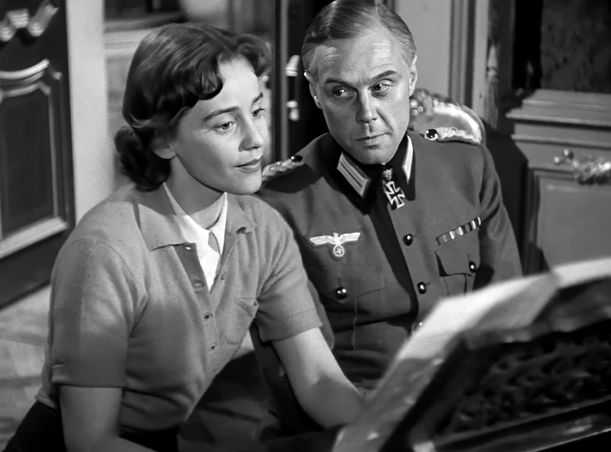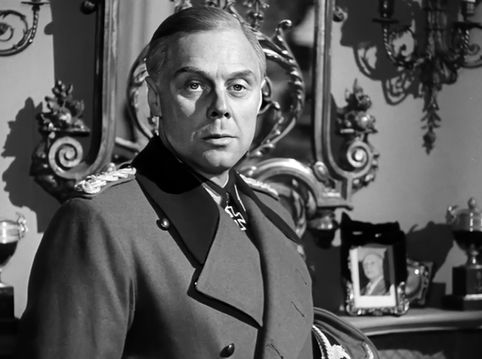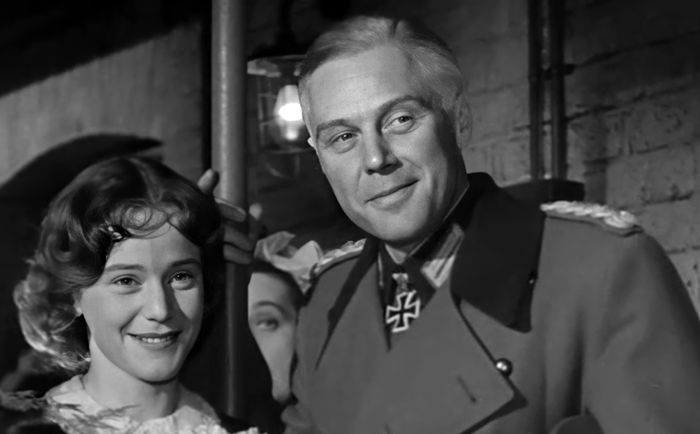Director: Compton Bennett
Writers: Noëlle Henry, John Cresswell
(from the novel Je ne suis pas une héroïne
also known as Der Abend in der Oper by Noëlle Henry)
Rôle: Colonel Günther von Hohensee
Release Date: 18 April 1952
Synopsis: In Belgium, during World War II, a young music student and her mother are the only ones left of a large family, the men having all been lost in the war against Germany. Their château is partially taken over by the German Military Commandant. The girl, Nicole, has an intense hatred for the Germans and tells the Commandant, Colonel von Hohensee, so. When they discover they have a mutual interest in music, especially the piano, they come to know each other better and fall in love. They know it is an impossible situation - especially the girl who is forced by the underground to steal documents and information from him - and realise their romance can only end in tragedy.
Comment: The working title of the film was 'Sunset at Morning' (see Picturegoer article of 26 May 1951 below). The film was made at Elstree studios but a unit went out to Belgium to film various outdoor scenes. The film unit based themselves in the town of Léau, a small town with a population of 2,000 about 45 miles east of Brussels. Some of the scenes were at the Château de Sterrebeek, just outside Brussels, which stood in for the Château de Malvines in the film. The Château de Sterrebeek, built in 1761 by Jean-Antoine Ories in a classicist style was rebuilt in 1908 by Maurice Despret in a neoclassical style. The castle and the gatehouse are protected as a monument and the entire park protected as a landscape in 1958.


Château de Sterrebeek/Kasteel van Sterrebeek today












Behind the scenes photos of filming in England and Belgium
Marius Goring said that other than the Powell and Pressburger films, this one was his favourite."A touching little film," said Goring, "my favourite apart from the Powell films. Maria Schell was beautiful and extremely good. It was too soon after the war and people thought every German was a horror...its timing was wrong. A year later, and it would have been all right".
Availability: DVD (Network) Release Date: 9 November 2015.

Background: I was able recently (December 2020) to obtain a 1954 edition in German of the book upon which this film is based, under the title ‘Der Abend in der Oper'. The Swiss author, Noëlle Henry wrote this novel in 1937. But it was not published until 1942, and several editions were out of print in Switzerland in quick succession. Due to the circumstances, the book remained virtually unknown in Germany.
A few changes were made from the novel to the film version. It was set in WWI not WWII and in France not Belgium. Nicole’s name in the book is Erica de Bois-Dauphin, Günther’s first name is Dietrich and he is a major, not a colonel. Gerard’s name was originally Olivier and the housekeeper is called Céline. The character of cousin Philipe is Nicole/Erica’s uncle Gilles.
It took a few days to translate but it was well worth the effort. Beautifully written and very touching.
Silver Wound Badge (Verwundetenabzeichen in Silber) on the lower left breast of his uniform tunic
On the Ribbon Bar - the medals run from left to right
1. Eastern Front Campaign Medal (Medaille Winterschlacht im Osten 1941/42)
2. West Wall Medal (Deutsches Schutzwall-Ehrenzeichen)
3. Sudetenland Medal (Die Medaille zur Erinnerung an den 1. Oktober 1938)
4. War Merit Medal (Kriegsverdienstmedaille)
Thanks to Michael from eMedals for identifying the medals on the ribbon bar




Colonel von Hohensee gives Nicole a piano lesson


Reviews: From an excellent review on IMDb by australiafelix: "So...on one level, So Little Time is about a profoundly ethical question: is it treason to love one's enemy during war? On another, it is about the most fatal kind of fatal romance: when enemies fall in love. Both parties know it will end badly, but...the heart wants what the heart wants. Was it Plato who said love is a kind of madness? For that reason Schell and Goring are compelling and believable as Nicole and Günther - particularly Goring, who struggles with his feelings for Nicole. The film also makes it clear that like many Wehrmacht German officers at that time, Günther perceives himself as a professional soldier, not a Nazi. We realise this in the final scene".


%2010%20November%20.jpg)








%2020%20Novembe.jpg)










































When the heart speaks... (So Little Time)
A Mayflower production by Associated British Ltd.
Book: John Cresswell
Produced by Aubrey Baring and Maxwell Setton
Director: Compton Bennett
Production Manager: E.M. Smedley-Aston
The actors and their German speakers:
Nicole - Maria Schell - Maria Schell
Colonel Hohensee - Marius Goring - Hans Nielsen
Lotte Schönberg - Lucie Mannheim - Hilde Heinrich
Madame de Malvines - Gabrielle Dorziat - Elly Burgmer
Anna - Barbara Mullen - Erna Nitter
Philipe de Malvines - John Bailey - Wolfgang Schwartz
Baumann - David Hurst - Claus Dieter Bove
Professor Perronet - Stanley van Beers - Joseph Offenbach
Gerard - Oscar Quitak - Alfred Lux
Paulette - Andree Melly - Ilse Zielstorff
German version: Rhythmoton-Production, Hamburg - Director: Werner Malbran
Madame de Malvines and her daughter Nicole live in a Belgian castle. During the German occupation, part of their property was taken over by the town's local commandant, Colonel Hohensee. He knows that the population, like everywhere else, is suffering from the effects of the war and tries as far as possible to properly alleviate their situation. One night, when Madame de Malvines has a violent heart attack, he immediately orders a German military doctor to come to the castle. The quick help saves the patient's life and Nicole, who hates the enemy, is forced to thank him. The young countess is extraordinarily musical. But Colonel Hohensee also loves music. His masterly playing arouses her admiration. Both discover their common love for music. From the first moment Nicole fought the enemy invader, but now she has to admit that she's starting to love him. Hohensee also loves Nicole.
A cousin of Nicole, Philipe de Malvines, is a member of the Belgian resistance movement. After escaping under a false name, he has secretly returned to the city and asks Nicole to provide him with valuable military documents from Hohensee's desk. Her lover senses that Nicole is playing a part in the conspiracy. During a heated argument between the two, Philipe, captured by the Germans, is brought in. Hohensee recognises him as Nicole's cousin and orders him to be taken to the headquarters for interrogation. He himself follows in his car. On the way, Philipe is freed by the resistance fighters. They want to take care of Hohensee now. Nicole knows about it and fears for the life of her lover. She runs after the car and insists that he give her a lift. On a lonely forest path, Philipe fires from an ambush. The bullet intended for Hohensee hits Nicole. She dies in Hohensee's arms.












